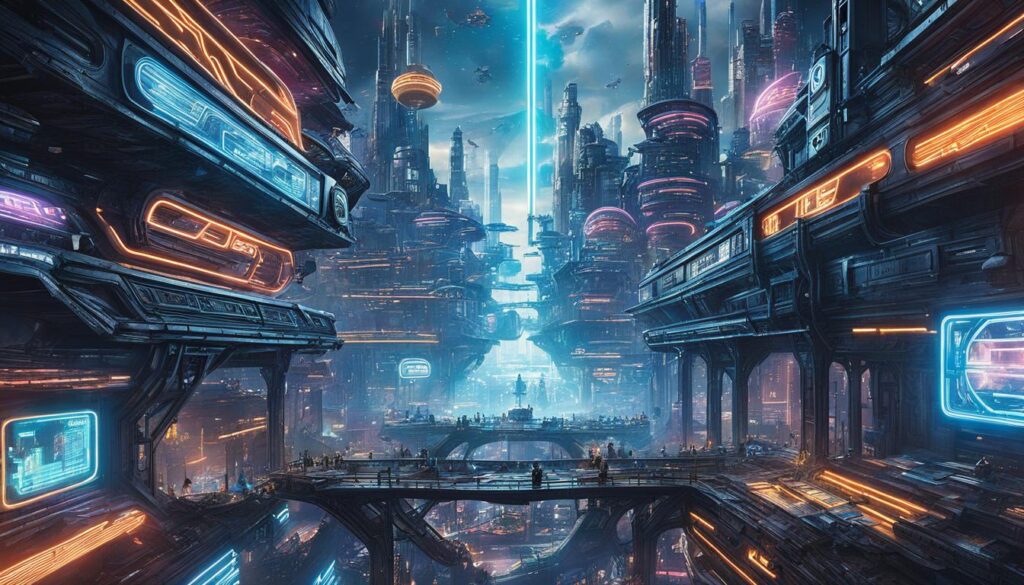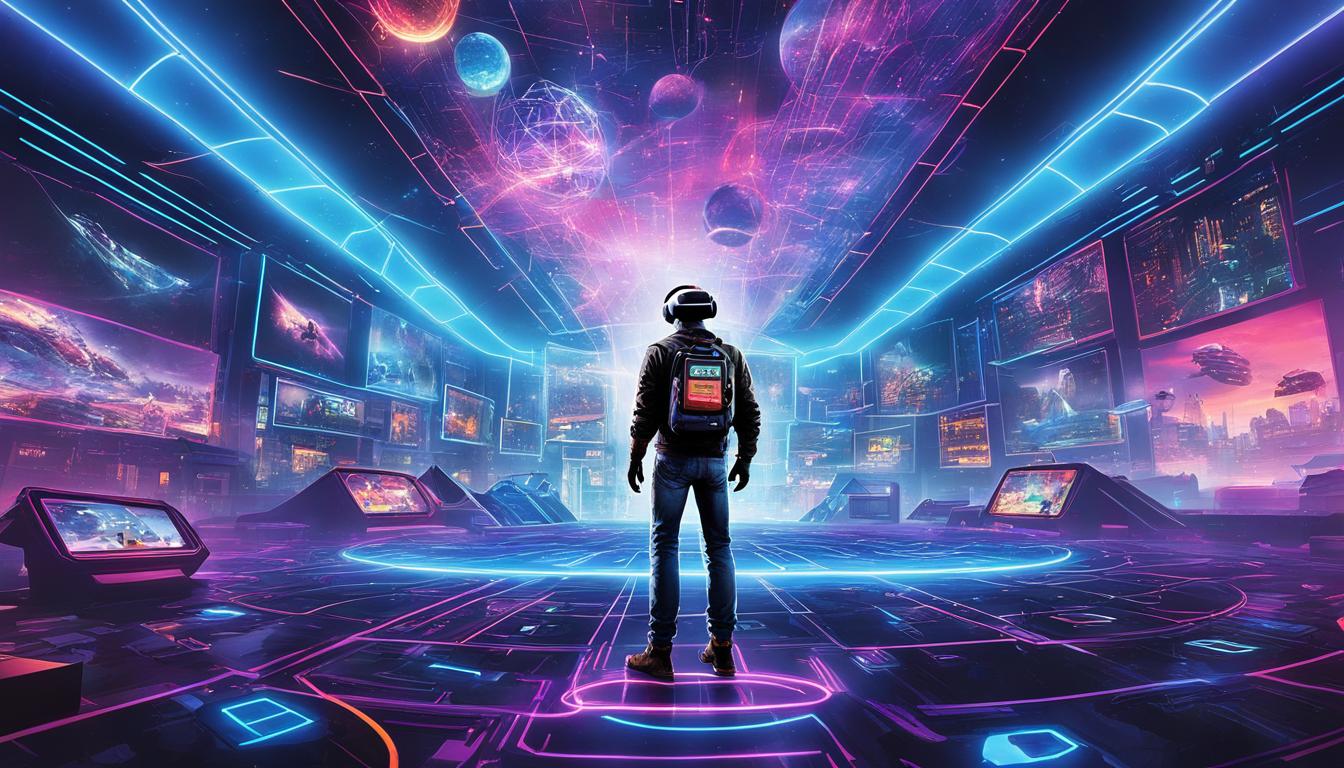If you’re in search of an immersive and captivating sci-fi adventure, look no further than the audiobook version of “Ready Player One” by Ernest Cline. With its intricate world-building, thrilling plot, and witty writing style, it’s no wonder this novel has become a cultural sensation. In this section, we’ll take a closer look at what makes this audiobook so enthralling and why it’s worth a listen.
Overview of “Ready Player One”
“Ready Player One” is a science fiction novel written by Ernest Cline. The book was published in 2011 and has been widely acclaimed by readers and critics alike. The novel follows the story of Wade Watts, a young man who finds himself immersed in a virtual universe called the OASIS. In this virtual world, he competes against others in a quest to uncover a hidden treasure left behind by the creator of the OASIS, James Halliday.
The novel is set in the year 2045, where the world is nearing collapse and most people spend their time in the OASIS to escape their bleak reality. The premise of “Ready Player One” is centered around the concept of a virtual universe and its significance to the story.
The book has received high praise for its world-building, character development, and engaging plot. It has also been adapted into a feature film directed by Steven Spielberg.
“A treasure hunt, an Indiana Jones-style adventure, and an addictive romp with pop culture thrown in for good measure.” – USA Today
Author Background
Ernest Cline is an American author, screenwriter, and fan of 1980s pop culture. Born on March 29th, 1972, in Ashland, Ohio, Cline was raised in the nearby town of Buckner, where he attended high school. He subsequently graduated from Ohio University with a degree in English and worked a variety of jobs, including as a fish gutter, before becoming a full-time writer.
Cline is best known for his science fiction novel “Ready Player One,” which was published in 2011 and quickly became a New York Times bestseller. The book’s success led to a film adaptation directed by Steven Spielberg in 2018.
Cline has also written other novels, including “Armada” and “Ready Player Two,” which continues the story of “Ready Player One.” He has also written numerous screenplays, including for the film adaptation of “Ready Player One.”
Plot Summary
Set in the year 2044, “Ready Player One” follows the story of Wade Watts, an impoverished teenager who becomes embroiled in a globally renowned virtual reality game called OASIS. After the game’s creator passes away, he leaves behind clues to a hidden game within OASIS that promises the winner his entire fortune.
Wade, along with a group of friends, sets out to find the hidden game, facing obstacles and challenges at every turn, including a powerful corporation determined to win at any cost. The novel is packed with 80’s pop culture references, as Wade’s obsession with the decade drives much of the story.
The plot takes readers on a thrilling adventure through the virtual world of OASIS, complete with intense battles, treacherous obstacles, and surprising plot twists. The story culminates in an epic showdown between Wade and his allies and the evil corporation, with the fate of the OASIS and its users at stake.
Writing Style and Narrative
Ernest Cline’s writing style in “Ready Player One” is a blend of pop-culture references, action-packed sequences, and vivid descriptions that transport the reader into a futuristic virtual universe. His narrative techniques add to the allure of the story by using first-person narration and a unique blend of present and past tenses to engage the reader. Cline’s use of dialogue is also noteworthy, as it showcases distinctive voices for each character and adds depth to their personalities.
The narrative itself is fast-paced and heavy on action, with an emphasis on adventure and discovery. The balance between exposition and action is handled well, with informative and descriptive passages that provide context without slowing down the plot. Cline also explores deeper themes such as the power of technology and gaming, the consequences of obsession, and the importance of human connection in a world increasingly dominated by screens.
Overall, Cline’s writing style and narrative techniques harmoniously work together to create a compelling and immersive reading experience for fans of science-fiction and gaming enthusiasts alike.
Character Development
One of the strengths of “Ready Player One” is the well-crafted characters and their development throughout the story. The protagonist, Wade, undergoes a significant transformation as he progresses through challenges and obstacles. From a timid, sheltered teenager, Wade grows into a confident, capable hero.
Other supporting characters, such as Art3mis, Aech, and Shoto, also showcase strong character development. They each have their own motivations for participating in the contest and their personalities are distinct and memorable.
Ernest Cline does an excellent job of revealing each character’s backstory and motivations through their actions and dialogue. The characters are multifaceted and are not merely defined as heroes or villains.
“…Wade’s acknowledgment of his own character flaws is what presents him as a well-rounded, realistic hero rather than a cliche.”
Themes and Messages
Ernest Cline’s “Ready Player One” presents numerous themes and messages that explore the challenges and opportunities presented by technology. The novel highlights the risks associated with overreliance on virtual reality technology, as well as the potential for technology to bring people together. Here are some of the key themes:
Escapism and Reality
“Ready Player One” explores the concept of escapism and its impact on people’s abilities to face reality. The novel suggests that while virtual reality offers a temporary respite from real-world problems, true happiness and closure can only be found by confronting one’s challenges head-on.
Technology and Society
The novel also addresses the role of technology in society, raising questions about the impact of new technologies on our values and interactions. The world of “Ready Player One” explores the potential for technological advances to either unite or divide people.
Identity and Self-Discovery
“Ready Player One” also delves into issues of identity and self-discovery. The novel suggests that people can achieve greater self-understanding by embracing their true selves and looking beyond the outward trappings of personal success.
Relationships and Connection
Another core theme in “Ready Player One” is the importance of relationships and connection in overcoming adversity. The novel portrays virtual reality technology as a vehicle for forging meaningful bonds, suggesting that human connection can be manifested through technology.
World-Building in the Virtual Universe
Ernest Cline’s “Ready Player One” presents a complex and detailed virtual universe, creating a vast and immersive world for readers to explore. The novel’s setting is the “OASIS”, a massive multiplayer online simulation game that has become a ubiquitous aspect of everyday life in the year 2045. The world-building in “Ready Player One” is one of its defining features, as it presents a unique and intricate world unlike any other.
The environments in the OASIS are diverse, ranging from fantastical landscapes to futuristic cities. Cline masterfully describes each world, providing clear and vivid descriptions that allow readers to imagine themselves within these digital spaces. Additionally, the author establishes an elaborate set of rules that govern the OASIS, which adds an extra layer of depth and verisimilitude to the virtual universe.
The parallels between the virtual universe portrayed in “Ready Player One” and our own world are evident. The OASIS is an exploration of what our future could look like, and Cline’s world-building allows for a thought-provoking reflection on the societal impact of technology. Overall, the world-building in “Ready Player One” is nothing short of breathtaking, creating a vivid and unforgettable virtual universe that readers will remain enchanted by.

Audiobook Narration
The narration of an audiobook can make or break the entire listening experience, and in the case of “Ready Player One,” it definitely enhances it. The audiobook version of Ernest Cline’s novel is narrated by actor Wil Wheaton, who does an exceptional job of bringing the story to life.
Wheaton’s performance captures the essence of the book’s protagonist, Wade Watts, perfectly. His voice inflections and vocal nuances help to convey the character’s emotions, making the listener feel more connected to him. Wheaton also does an excellent job of voicing the supporting characters, giving each of them a unique and distinct personality.
Overall, the narration of the “Ready Player One” audiobook is top-notch and adds an extra layer of immersion to an already captivating story.
Visual Imagery and Descriptions
Ernest Cline’s descriptions in “Ready Player One” are vivid and full of visual imagery. As Wade Watts navigates through the virtual world of the OASIS, the readers are transported alongside him, experiencing the sights and sounds in intricate detail.
The descriptions of the various environments, from the virtual school where Wade attends class to the bustling streets of the virtual city, are rich and immersive. The reader is able to visualize the neon lights and towering buildings as if they were right in front of them. The contrast between the vivid, detailed world of the OASIS and the drab, desolate reality outside of it is stark and effectively enhances the overall reading experience.
Cline’s attention to detail is apparent not only in the environment but also in the depiction of the characters. The descriptions of their avatars, from the armor and weapons they use in battles to their facial expressions and gestures during conversations, add depth and personality to each character.
The visual imagery and descriptions used by Ernest Cline in “Ready Player One” are some of the book’s greatest strengths. They bring the virtual world to life and make it feel as real as the world outside of the OASIS.
Pacing and Suspense
“Ready Player One” is a masterclass in pacing and suspense. Ernest Cline’s ability to keep readers on edge is second to none. The story starts with a bang and never slows down for a second. Every chapter is filled with action, adventure and a sense of urgency that always leaves the reader wanting more.
Cline’s pacing is relentless, pulling the audience from one puzzle to the next, and building the tension to a fever pitch. For example, when the protagonist, Wade Watts, finds the first key, the race to complete the quest becomes even more intense. This competition adds to the suspense as Wade and his friends try to outwit their opponents and find the remaining keys.
The way Cline ends each chapter is particularly masterful, always leaving readers wanting more. Whether it’s a cliffhanger ending or a new twist in the plot, Cline knows how to keep the audience hooked.
Reception and Critiques
Since its release in 2011, “Ready Player One” has been widely recognized and praised for its remarkable world-building and engaging storyline. The book debuted at #6 on the New York Times Best Seller list and topped several other charts, including IndieBound and The Book Depository. In 2012, it won the Prometheus Award for Best Novel and was nominated for the British Science Fiction Association award, among others.
While many readers and critics have praised the novel, there have also been some critiques. Some have argued that the writing style is overly simplistic and lacks depth, while others have noted that some elements of the story, such as the treatment of female characters, could have been developed more thoroughly.
Despite the criticisms, “Ready Player One” remains a beloved title within the science fiction genre and has even been adapted into a major motion picture by Steven Spielberg. The novel’s impact on the genre is undeniable, inspiring a new wave of science fiction works that incorporate virtual reality and video game references.
The Impact of “Ready Player One”
“Ready Player One” has had a significant impact on the science fiction genre, particularly in shaping the virtual reality sub-genre that followed in its wake. The novel’s exploration of a fully immersive, all-encompassing virtual world has influenced many recent works, including the hit television series “Westworld” and the novel “Snow Crash” by Neal Stephenson.
Comparison to Other Works
| Work | Similarities | Differences |
|---|---|---|
| “Snow Crash” by Neal Stephenson | Both explore virtual reality and dystopian futures. | The tone of “Snow Crash” is darker and more satirical. |
| “Ender’s Game” by Orson Scott Card | Both feature teen protagonists in life-or-death situations. | The focus of “Ender’s Game” is on interstellar warfare rather than virtual reality. |
| “The Hunger Games” by Suzanne Collins | Both have dystopian themes and feature a battle to the death. | “The Hunger Games” is not centered around virtual reality. |
Comparisons with the Film Adaptation
While both the “Ready Player One” audiobook and film adaptation tell the same story, there are significant differences between the two mediums.
The audiobook provides a more immersive experience, allowing readers to fully delve into the world and characters of the story. Narrator Wil Wheaton’s performance adds depth and emotion to the characters, making their struggles more palpable.
The film adaptation, on the other hand, takes a more visual approach to storytelling. The use of CGI and special effects highlights the fantastical elements of the virtual universe and adds a layer of spectacle to the story.
However, some fans of the book have criticized the film for deviating from the source material and condensing certain plot points for time. Others have praised the changes made, arguing that they make for a more streamlined and cinematic experience.
“The film adaptation of ‘Ready Player One’ is a visual feast, but the audiobook is a more intimate and emotional experience.”
Impact and Legacy
Since its release in 2011, Ready Player One has made a significant impact on both readers and the science fiction genre. The novel’s exploration of a virtual world has resonated with audiences and continues to influence popular culture.
The book has been translated into over 20 languages and has sold millions of copies worldwide. Its popularity led to the production of a film adaptation directed by Steven Spielberg in 2018.
Many critics have praised the novel for its imaginative world-building and thrilling plot. It has been awarded several prestigious awards, including the Prometheus Award and the Alex Award.
Furthermore, Ready Player One has had a lasting legacy on the science fiction genre, inspiring new stories and immersive virtual experiences. Its impact on popular culture continues to be felt today and will undoubtedly inspire future generations of writers and creators.
Recommendations and Audience
Based on our review of “Ready Player One,” we recommend this audiobook to science fiction enthusiasts, gamers, and anyone who enjoys a thrilling adventure set in a unique and imaginative world. The target audience for this audiobook is likely to be younger adults and teenagers, but anyone who enjoys science fiction and virtual reality settings will find something to enjoy in “Ready Player One.”
If you enjoyed “Ready Player One,” we suggest checking out the following titles:
| Title | Author | Similarity to “Ready Player One” |
|---|---|---|
| Armada | Ernest Cline | Another sci-fi adventure with a focus on gaming and virtual reality |
| Red Rising | Pierce Brown | A dystopian society with a strong focus on action and adventure |
| Warcross | Marie Lu | A virtual reality game with high stakes and thrilling action |
| Snow Crash | Neal Stephenson | An exploration of virtual reality and the blurred lines between reality and the digital world |
Conclusion
Overall, “Ready Player One” by Ernest Cline is an exceptional audiobook that offers a gripping storyline, compelling characters, and an immersive virtual universe. The combination of Cline’s writing style and the performance of the narrator makes for an entertaining and satisfying listening experience.
The dystopian world created by Cline provides a thought-provoking commentary on the intersection of technology and society. The fast-paced narrative keeps listeners engaged and the vivid descriptions bring the virtual world to life.
While the audiobook has received some critiques, including pacing issues and a lack of depth in character development, these minor flaws do not detract significantly from the overall quality of the story.
“Ready Player One” is a recommended audiobook for fans of science fiction, dystopian fiction, or anyone looking for an exciting and engaging listening experience. It is an impressive debut novel by Ernest Cline that has left a lasting impact on the science fiction genre, paving the way for future works to come.



